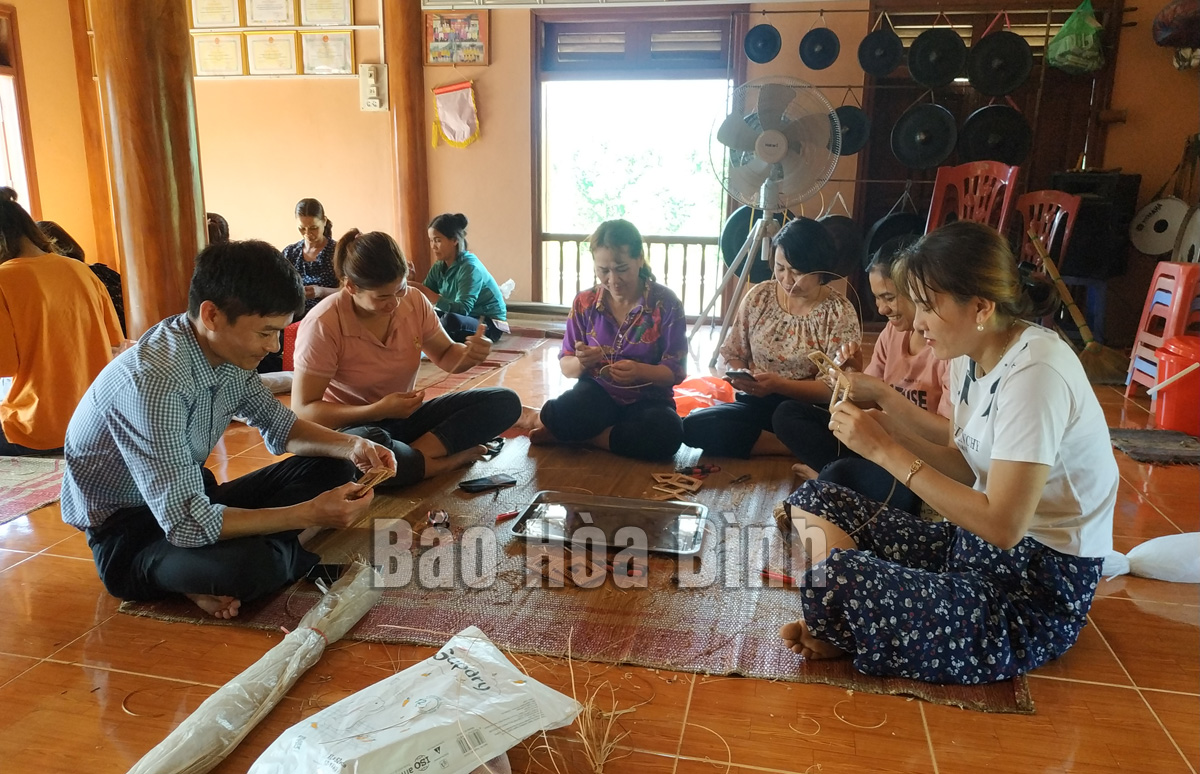
(HBO) - Providing vocational training and improving the quality of human resources is one of the policies carried out by provincial Party committees and administrations at all levels in Hoa Binh province, aiming to promote socio-economic development in ethnic minority-inhabited areas. Despite facing difficulties due to the unfavourable terrain and limited knowledge, many localities have carried out vocational training combined with job creation, bringing positive results.
A welding
class in Thong Nhat commune, Lac Thuy district.
Thong Nhat, a remote commune in Lac Thuy district, has more than 70% of its
population are ethnic minority people. It is home to five extremely disadvantaged
hamlets.
Implementing socio-economic development policies for ethnic minorities and
mountainous areas, the commune has coordinated with relevant agencies to open
many vocational training classes for rural workers. Priority has been given to
poor, disadvantaged and policy-beneficiary households. Three vocational
training classes were organised by the commune this year, attracting more than
130 labourers.
Bui Van Huan, Vice Chairman of the Thong Nhat Commune People's Committee, said
that welding and industrial sewing are selected for vocational training because
there are many enterprises that want to recruit workers with welding skills in
the locality. There are three garment factories that are in need of female
workers, thus the commune proposed the district Centre for Continuing Education
and Vocation Training to organise classes to create employment opportunities
for workers, ensuring that they will get jobs after completing their training.
Improving the quality of vocational training in association with job creation
and helping people secure a sustainable livelihood, is also the target of the
district in this regard.
Dang Thi Vy, Deputy Director of Lac Thuy district’s Centre for Continuing
Education and Vocational Training, said before opening classes, it conducted
surveys on the demand of enterprises and labourers. After collecting data, the
district coordinated with enterprises to develop plans and carry out
on-the-spot vocational training. Five classes have been organised by the centre
so far.
Da Bac district has allocated 1.4 billion VND (59,550 USD) for holding 17
training classes for ethnic minority people under the socio-economic
development project in ethnic minority-inhabited and mountainous areas for the
2021-2025 period.
Dinh Thi Nam, Head of the Division of Ethnic Minority Affairs of Da Bac
district, said that the district has many potential and advantages for tourism
development, especially community-based tourism. To improve the quality of
human resources for the development of the tourism industry, it has offered
training in such professions as tour guide, cooking, and brocade embroidery.
In line with the National Target Programme on Socio-economic Development in the
ethnic minority-inhabited and mountainous area for the 2021 – 2025 period, the
province aims to fulfill the target of about 63% of labourers of the working
age will receive proper vocational training that is suitable to their
aspirations and living conditions.
To this end, the provincial People's Committee has directed departments,
agencies and People's Committees of districts and cities to promptly develop
plans and carry out vocational training programmes for workers in the ethnic
minority-inhabited and mountainous areas.
Attention will be paid to dissemination and providing counseling for ethnic
minority people in selecting occupations that are suitable totheir
conditions and capacity.
Along with supporting costs for vocational training and changing occupations
for households and ethnic minorities, the province will continue to have
mechanisms to encourage businesses, cooperatives, and establishments to recruit
workers that have undergone training./.
The Standing Board of the Hoa Binh provincial Party Committee has agreed in principle on a proposal by the Standing Board of the Party Committee of Hoa Binh city to gather feedback on the city’s 1:2000 zoning plan, which forms part of its broader urban development strategy.
Hoa Binh province has made notable progress in public administration reform and digital government development, with the satisfaction index among citizens and businesses reaching over 84%, according to recent government evaluations.
Thanks to great efforts by local authorities in recent times, the governance and public administration performance of Mai Chau district has been significantly improved.
In the afternoon of June 6, the Party Committee, the People's Council, the People's Committee and the Fatherland Front of Lac Son district solemnly held a meeting to celebrate the 139th anniversary of the district's founding (1886–2025) and the 79th anniversary of the establishment of the district's Party Committee (1946–2025). There was the attendance of Mr. Bui Van Thang, the Vice Chairman of the Provincial People's Council; Mr. Quach Tat Liem, the Vice Chairman of the Provincial People's Committee; Ms. Dang Bich Ngoc, the Deputy Head of the National Assembly Delegation of the province; as well as the former leaders of the province and district through various periods, who are the natives of the district.
Implementing the Politburo’s Resolution No. 57-NQ/TW on breakthroughs in science – technology, innovation, and digital transformation is a golden opportunity for the northern mountainous province of Hoa Binh to renew growth model, improve competitive edge and shorten digital gap.
Resolution 57-NQ/TW, issued by the Politburo on December 22, 2024, identifies sci-tech, innovation, and digital transformation as strategic breakthroughs to build a developed and prosperous nation. In Hoa Binh province, this spirit is not just a slogan, it’s being put into action through concrete initiatives that form a "new development triangle”: digital citizenship, digital economy, and digital administration.



